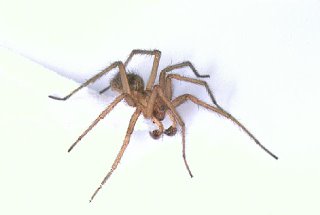Ick

I actually don't kill spiders if I see them. They eat other pests like ants and roaches. The Hobo Spider site also says traps aren't really that effective, and that the best detterent, is competing spiders.
Woman bitten by spider loses 10 lbs. of skin
Doctor predicts it may take six months for full recovery from small nip
HERMISTON, Ore. - A small spider bite turned out to be a big problem for Cindy Pettey. Pettey awoke when she was bitten on the stomach in the middle of the night a few weeks ago, but thought little else of it. Then she started running a fever, she felt achy and weak. The bite sore became larger.
Next thing Pettey knew, a doctor was telling her he believed she'd been bitten by a dangerous hobo spider.
Pettey had surgery that removed 10 pounds of skin and flesh, leaving her with an abdomen covered in stitches.
"It looks like I was bit in half by a shark," Pettey said.
Rob Hendrickson, a physician and director of the Oregon Poison Control Center, said the hobo is a non-aggressive spider that bites only when cornered. For example, when someone puts on a shoe with a spider inside.
The hobo is one of two dangerous spiders in Oregon. The other is the black widow. The brown recluse does not exist in Oregon, he said.
"In reality, most spiders are venomous, but aren't capable of penetrating human skin," Hendrickson said.
Hobo spider venom may cause necrosis, or death of the skin. When a spider injects venom below the skin, it reddens, swells, then turns black. But there is some doubt in the medical community about whether venom causes the skin death, Hendrickson said.
"If the venom can actually cause necrosis in humans," he said, "... then it is a very rare event."
Pettey isn't taking any more chances. She found five or six spiders that look like hobos. She also discovered two funnel webs like those made by hobo spiders. The webs, layered and non-sticky, funnel unwary prey toward a circular opening at the bottom of the web.
"I put hobo spider traps all over my house," she said.
Pettey's strength is returning slowly. She works five or six hours a day at her job at the Pilot Travel Center, then returns home exhausted. Her doctor told her it might be six months before she fully regains her energy.
"I come home and sleep for three hours," Pettey said. "It really zaps me."





0 Comments:
Post a Comment
Subscribe to Post Comments [Atom]
<< Home